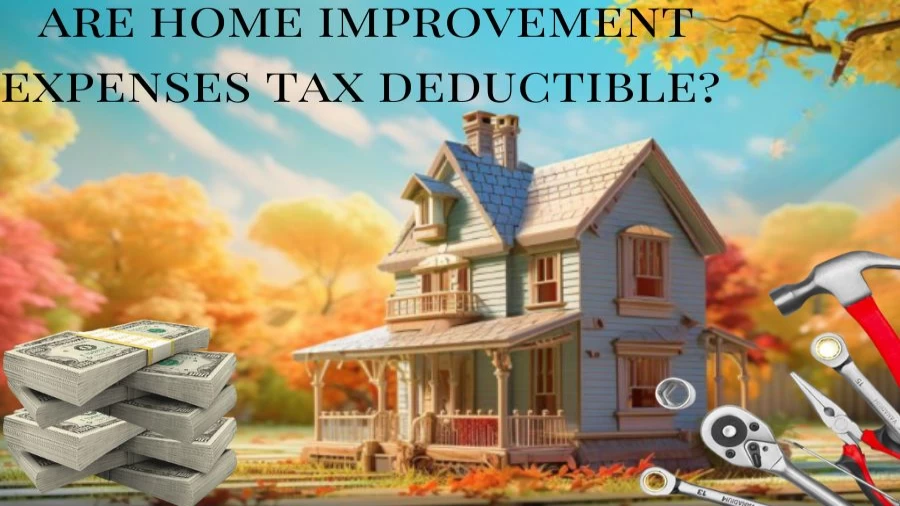
Are Home Improvement Expenses Tax Deductible? What Home Improvements Are Tax Deductible 2023?
In general, home improvement expenses are not tax deductible, except for specific cases such as energy-efficient upgrades or medical-related modifications.
by Kowsalya
Published Aug 21, 2023 | Updated Aug 21, 2023 | 📖 11 min read
On This Page
- Are Home Improvement Expenses Tax Deductible?
- What Home Improvements Are Tax Deductible 2023?
- What is a Home Improvement?
- What is Tax Reduction?
- How to Save Tax on Rental Income?
- Are Home Repairs Tax Deductible?
- What Are the Advantages and Disadvantages of Home Improvements?
- What is the Concept of Home Improvements Carried Out for Medical Purposes?
Are Home Improvement Expenses Tax Deductible?
While it's widely known that most home improvements on a personal residence are not eligible for tax deductions in the context of federal income taxes, there are a couple of exceptions worth exploring. One potential avenue for tax benefits is related to the installation of energy-efficient equipment, which could make you eligible for a valuable tax credit. Additionally, renovations undertaken for medical purposes might qualify as tax-deductible expenses.
It's important to note that undertaking home renovations can yield financial benefits beyond immediate tax deductions. By investing in your property's energy efficiency, you could potentially lower your future energy bills while simultaneously benefitting from a tax credit. Likewise, if you undertake renovations specifically for medical reasons such as modifying your home to accommodate a disability you may be able to claim these expenses as deductible medical kf/costs.
An additional financial advantage of renovating your home pertains to its potential impact on capital gains taxes when you eventually decide to sell. When you make improvements to your property, you effectively increase its overall financial investment value.
This, in turn, can potentially reduce the taxable capital gains you'll incur upon selling the property. By enhancing your home through renovations, you're not only making it a more comfortable and functional space for yourself but also potentially positioning yourself for better financial outcomes in the future.
It's worth noting that while there are instances where you might qualify for tax benefits due to home improvements, these cases are relatively rare. Therefore, it's essential to consult with a tax professional to fully understand the implications of your specific situation and to ensure compliance with tax laws.
While home improvements are generally not considered tax-deductible expenses under the United States tax code, being aware of potential exceptions and understanding the broader financial implications of renovations can help you make informed decisions about investing in your home.
If you're looking for assistance in navigating the complex landscape of tax regulations and implications, you might find value in exploring recommendations for top tax software tools provided by sources like Personal Finance Insider. However, it's crucial to recognize that undertaking projects like building a patio or renovating a kitchen primarily for personal enjoyment or aesthetic purposes is unlikely to yield tax breaks.
What Home Improvements Are Tax Deductible 2023?
Commencing in 2023, individuals who are homeowners and undertake energy-efficient enhancements to their residences could potentially avail themselves of a federal tax credit. This credit is applicable to a range of upgrades, including the incorporation of solar panels, the installation of geothermal heating and cooling systems, as well as the implementation of energy-efficient windows and doors.
Specifically, homeowners who opt for energy-efficient windows, doors, and insulation installations stand to benefit from tax deductions that are now accessible. Referred to as the Residential Clean Energy Credit, this provision enables you to claim a credit of up to 30% of the total purchase price for environmentally conscious appliances and home fixtures.
The eligibility for this tax credit, established in 2023, highlights the government's focus on incentivizing eco-friendly choices in homeownership. By embracing energy-efficient technologies such as solar panels and geothermal systems, property owners can not only contribute positively to the environment but also experience potential financial advantages through reduced energy costs.
Furthermore, upgrading windows, doors, and insulation not only enhances a home's energy efficiency but also provides homeowners the opportunity to access tax deductions, effectively making such improvements more financially accessible.
It's important to understand that the Residential Clean Energy Credit represents a significant stride towards encouraging sustainable practices in housing. By allowing homeowners to recoup a portion of their expenses for adopting environmentally friendly enhancements, the government is fostering a more energy-efficient and environmentally conscious society.
This tax credit serves as a tangible recognition of the value that energy-efficient upgrades bring to both homeowners and the larger community, simultaneously promoting responsible stewardship of resources and potential long-term savings.
The new federal tax credit introduced in 2023 provides homeowners with a compelling incentive to make energy-efficient changes to their homes. From solar panels to energy-efficient windows and doors, these upgrades not only contribute to a more sustainable future but also offer the potential for reduced energy expenses and accessible tax deductions. This initiative reflects a broader commitment to fostering eco-conscious choices and rewarding individuals who prioritize environmentally friendly enhancements in their residences.
What is a Home Improvement?
When considering taxation matters, a home improvement is defined as work carried out on a residence that meets one or more of the following criteria: significantly enhances the property's value, extends its functional lifespan, or allows it to be repurposed for new uses.
Illustrations of home improvements encompass a wide range of projects, such as adding rooms, constructing new bathrooms, building decks, installing fences, improving landscaping, upgrading wiring systems, creating walkways, establishing new driveways, enhancing kitchens, upgrading plumbing systems, and replacing or installing new roofs.
These examples effectively exemplify the diversity of activities that can qualify as home improvements, all of which contribute to augmenting both the practical utility and the market worth of the dwelling.
What is Tax Reduction?
In the process of filing your tax returns, a tax deduction holds the capacity to decrease your adjusted gross income (AGI) by the precise dollar value attributed to the deduction. By diminishing your AGI, the overall sum of tax liabilities owed to the IRS is subsequently reduced.
The eligibility for a tax deduction associated with home improvement hinges on various factors. Depending on these criteria, the deduction can be taken in entirety within a singular tax year, distributed across multiple years, or possibly applicable solely when the property is sold. This variability in timing for claiming deductions is influenced by the nature and scope of the home improvement projects, providing taxpayers with flexibility to optimize their tax benefits while complying with pertinent regulations.
How to Save Tax on Rental Income?
Discovering strategies to minimize tax obligations on your rental income can significantly enhance your financial position. Here are valuable tips to efficiently save on taxes while deriving rental benefits:
- Maintenance Charges Allocation: A straightforward approach involves excluding maintenance charges from the rent. Omitting these charges from the rent amount effectively reduces the taxable rental income. By clarifying in the rental agreement that tenants can pay maintenance directly to the society association, you ensure that these costs are not factored into the taxable amount. For instance, if the rent is Rs 30,000 and maintenance is Rs 5,000, omitting the latter from the taxable base saves you tax on the maintenance component.
- Joint Property Ownership: Purchasing a property jointly with a trusted family member, like a spouse or parent, presents an opportunity to share the tax burden. By distributing the rental income between co-owners, tax liabilities can be reduced proportionately. This strategy leverages the principle of income-sharing and optimizes tax savings.
- Deductible Municipal Taxes: Municipal taxes, such as property and sewage taxes, can be deducted from rental income. These payments, which are the responsibility of the property owner, effectively diminish the taxable rental amount. This practice aligns with tax regulations and lowers your tax liability.
- Segmented Charges for Furnished Properties: If your rental property offers additional services like Wi-Fi, DTH, or utility connections, consider segregating these charges from the rent. By collecting these charges separately from the tenant, you lower the taxable rental income. This approach helps you pay taxes on a reduced income, reflecting the actual financial benefits you receive.
Incorporating these techniques allows you to navigate the tax implications of rental income more strategically. It's crucial to understand that the Income Tax department, through Section 24, applies taxation on rental income. Utilizing deductions, joint property ownership, and optimizing property offerings can lead to substantial tax savings, providing you with greater financial flexibility and a more efficient utilization of your rental revenue.
Are Home Repairs Tax Deductible?
Distinguishing between repairs and improvements in the context of home maintenance is crucial as it has direct implications on tax deductibility and the overall value of your property. Repairs entail actions taken to address issues without substantially enhancing the property's value, extending its useful life, or facilitating new purposes. For instance, replacing a few loose shingles on the roof qualifies as a repair, whereas a complete roof replacement is considered an improvement due to its transformative impact.
Importantly, repairs performed on your personal residence do not hold tax deductibility and do not contribute to an increase in the property's basis. This signifies that these repair costs do not yield any direct tax benefits or impact on your tax liability.
However, specific circumstances can warrant tax deductions for repairs. If your home accommodates a tax-deductible office space, repairs made to this area can be deducted. The same applies if you rent out a portion or the entirety of your home.
Repairs exclusive to your home office or a room leased full-time qualify for 100% deduction. Conversely, for repairs that benefit the entire home like roof repairs a proportional allocation is required based on the percentage of the property used for rental purposes. To illustrate, if your home office occupies 20% of your residence and you spend $1,000 on roof repairs, you can claim a deduction of $200.
In summary, understanding the distinction between repairs and improvements is pivotal for navigating tax implications. While repairs to your personal residence lack tax deductibility and impact, situations involving a tax-deductible home office or rental arrangements introduce opportunities for legitimate tax deductions based on the specific usage proportions.
What Are the Advantages and Disadvantages of Home Improvements?
Home improvements come with a range of advantages and disadvantages, which should be carefully considered before embarking on any renovation projects. Here's an overview of both sides:
Advantages of Home Improvements:
- Increased Property Value: Well-planned and executed home improvements can substantially increase the market value of your property. This can be advantageous if you plan to sell in the future.
- Enhanced Comfort and Functionality: Home improvements can enhance your living experience by making your home more comfortable and functional. Upgrades like better insulation, modern appliances, and improved layouts contribute to a more enjoyable living environment.
- Reduced Energy Costs: Energy-efficient upgrades, such as installing solar panels, energy-efficient windows, and insulation, can lead to lower utility bills, saving you money in the long run.
- Customization: Home improvements allow you to personalize your living space according to your preferences and needs, making your home truly your own.
- Health and Safety: Improvements related to safety features, like fire alarms and security systems, can provide peace of mind for you and your family.
Disadvantages of Home Improvements:
- Cost: Home improvements can be expensive, and the return on investment isn't always guaranteed. Overspending on renovations might not yield proportional gains in property value.
- Disruption: Major home improvements can disrupt your daily routine. Living through construction can be inconvenient and stressful.
- Unforeseen Issues: Renovation projects can uncover hidden problems that require additional spending and time to address, increasing the overall cost.
- Over-Improvement: It's possible to invest more in home improvements than what the local housing market can support, leading to difficulty recouping the expenses when selling.
- Regulatory Hurdles: Some improvements might require permits and adhere to local building codes. Navigating these regulations can be time-consuming and complex.
- Opportunity Costs: Money spent on home improvements might be used for other investments or experiences that could yield higher returns or greater satisfaction.
- Taste and Trends: Design choices that seem trendy today might become outdated in a few years, potentially affecting the resale value.
What is the Concept of Home Improvements Carried Out for Medical Purposes?
The IRS allows you to deduct medical expenses that are above 7.5% of your adjusted gross income, and in some cases home improvements can count toward these medical expenses.
You can deduct only improvements that are needed for a medical reason for yourself, your spouse, or your dependent. Any additional changes you make to improve your home's appearance or architecture.
Medical home improvements are fully deductible only if they don't cause your home's value to rise. If a remodel boosts your home's value, then you have to subtract the increase in value from the cost of the improvement. The result is the portion of your spending that can qualify for the medical deduction.
The IRS gives several examples of home improvements that generally don't increase a home's value and that are eligible for the full deduction.
Examples of medical home improvements
- Adding ramps into or out of your home
- Widening doorways or hallways to make them wheelchair accessible
- Lowering kitchen cabinets
- Modifying smoke detectors
- Adding grab bars
- Installing porch lifts (but the IRS says that elevators usually add to the value of a home and can't be fully deducted)
Are Home Improvement Expenses Tax Deductible-FAQs
1. Are Home Improvement Expenses Tax Deductible?
In general, home improvement expenses are not directly tax deductible. However, there are specific situations where you might be eligible for tax deductions or credits related to certain types of home improvements.
2. Can I Deduct Home Improvement Costs from My Income Taxes?
Typically, expenses for routine home improvements, such as renovations for personal enjoyment or aesthetic upgrades, are not deductible. These are considered personal expenses.
3. Are Medical Home Improvements Tax Deductible?
Yes, renovations made to your home for medical purposes might be tax deductible if they qualify as medical expenses.
4. Can I Deduct Home Office Renovation Costs?
If you use a portion of your home exclusively for business purposes and meet specific criteria, you might be able to deduct a portion of your home office renovation costs. This deduction is based on the percentage of your home used for business.
5. What About Home Improvements for Rental Properties?
Renovations made to rental properties are typically considered business expenses and can be deducted against your rental income.




